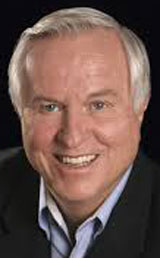Today we spoke with Josh McDowell regarding the inerrancy of Scripture and discoveries being made in biblical archeology. He also gave us his thoughts about the future of the evangelical church. You can find Josh’s latest resource "God-Breathed" at www.readGodBreathed.com.
1) Trust in the inerrancy of Scripture, even among some evangelicals, has waned in recent years. Why do you think this is?

There is no one reason. I think one of the major reasons is the information glut on the Internet. The Internet is so gigantic. It has leveled the playing field. Atheists and agnostics have such ready access to our kids. It didn’t use to be this way. Now, information—good and bad—is just one click away. Pastors, youth pastors, professors, and others are being confronted with deep theological, philosophical, and historical challenges to the Scriptures that no one would even hear about until their fourth year at a university. Believers are being confronted with so many opposing positions on the Scriptures—issues the majority from past generations simply didn’t confront. This has tended to undermine people’s belief system. That is why we need to redouble our efforts to communicate biblical truth.
The epistemological shift in the understanding of truth has gone from objective to subjective truth. It has gone from external to internal. Today, many Christians say that certain biblical truth might be true for you, but it’s not true for me. That’s been around for 30 years. This thinking is taking root in the church. Postmodernism is the philosophy that succeeded and, to some degree, supplanted modernism, a way of thinking that has challenged the Christian worldview for centuries. Whereas modernism rejected religion and superstition in favor of science and reason, today many reject any appeal to reality or truth.
2) You commissioned a team to examine these new Egyptian manuscripts. What new light will these shed on textual criticism and translation work?
Some of these discoveries from New and Old Testament fragments I recently acquired are some of the earliest known manuscript passages in existence. I don’t want to over-blow the importance of our part in what is being called an avalanche of new evidence in manuscript discovery in the entire body of Christ. Biblical archaeology is an ongoing pursuit and scientists are continually making new discoveries, literally every week. Each time we discover more fragments such as these, they add to the already massive numbers of Old and New Testament manuscripts. Today, there are more than 24,000 New Testament manuscripts in libraries, universities, and private collections throughout the world, and over 66,000 scrolls and manuscripts of the entire Bible. We expect another 1,000 Greek manuscripts will likely be discovered in the next few years.
Something is happening here that is reinforcing manuscript authority. In my recent discovery in an ancient codex, we found two of the oldest fragments from the Sermon on the Mount: Matthew 6:33 (Seek you first the kingdom of God) and Matthew 7: 4 (Take the log out of your own eye first). These discoveries take us back to around 300 AD. That’s ancient, and it bridges many years of manuscript copies on the Sermon on the Mount. That’s what these manuscript discoveries do; they help us reconstruct the actual wording of scripture and the exact lettering of that time.
In fact, a top Greek scholar of biblical artifacts recently said that in all these manuscripts that are being discovered today, you could now intellectually say that we possess the exact wording of Jesus in the New Testament, though we don’t know exactly what that is yet. With current technology, maybe in five to six years, we could possibly reconstruct a New Testament of the original wording stated by Jesus. I never dreamed this could happen in my lifetime.
Believers are being confronted with so many opposing positions on the Scriptures—issues the majority from past generations simply didn’t confront.
3) You've been a leader in the evangelical movement for several decades. In your view, what concerns you about where we are today?
Probably my greatest concern and fear is about the invasiveness of the internet—especially regarding pornography. Hebrews 12 calls us to “lay aside every encumbrance and the sin which so easily entangles us, and let us run with endurance the race that is set before us, fixing our eyes on Jesus, the author and perfecter of faith.” I think the number one thing that is entangling so many in the church today is invasive internet pornography.
Pornography is causing a lot of people to fail, to drop out on their faith because of their moral issues. I think this is one of the greatest threats to the cause of Christ today, because it undermines a believer’s walk with Christ and his or her beliefs. My fear is that many pastors are not addressing it because they're involved in it too. Somehow, we've got to get the leadership in the body of Christ addressing this.
In addition to the shame and loneliness that pornography causes, it equally produces a question about the authority of the Scripture, of Christ’s deity and of his Resurrection. It starts to darken the door of the brain to consider the core truths of the Christian faith. You have to understand: pornography can just take over a person’s life. As a result, it doesn't leave much room for a person’s walk with Christ. That is why focusing on the power and reliability of Scripture is so important. A person that is continually being immersed in God’s Word is building a protection against being caught up in pornography.
If the church was quick to change and adapt, like most people want, I am not sure the church, as we know it, would be around right now.
4) What gives you hope about the evangelical movement?
People joke that the church is like a huge passenger ship that takes forever to turn around. They criticize the church for that. I think that this is a blessing because it has kept the church from a lot of heresy. If the church was quick to change and adapt, like most people want, I am not sure the church, as we know it, would be around right now.
In the midst of it all, I have hope that God is raising up some great millennial leaders. These younger men and women are going to make a great difference. For example, we have more young apologists now more than ever. This is healthy. There are guys like myself still around to champion these younger apologists as they provide a new generation with solid reasons to believe that Christ is who he claimed to be and that the God-breathed words of Scripture are still undeniably powerful and reliable. That gives me great hope!
Daniel Darling is vice-president of communications for the Ethics and Religious Liberty Commission. He is the author of several books, including his latest, Activist Faith.










